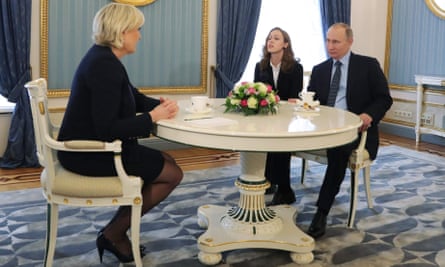Vladimir Putin has received Marine Le Pen in the Kremlin in a surprise move likely to reignite fears in Europe about Russian support for the European far right.
Putin told Le Pen Russia had no intention of meddling in the French presidential elections, though the meeting is likely to send the opposite message.
“We do not want to influence events in any way, but we retain the right to meet with all the different political forces, just like our European and American partners do,” said Putin.
Le Pen travelled to Moscow at the invitation of an MP for meetings in the Russian parliament, and had not been expected to meet Putin. However, after the parliamentary meetings were over the Front National candidate soon appeared in televised pictures from inside the Kremlin.
“Of course, it would be very interesting to share our opinions about how our bilateral relations are doing, and about the situation that is developing in Europe,” Putin told Le Pen. “I know that you represent a European political force that is growing quickly.”

Speaking after their meeting, Le Pen said Putin represented “a sovereign nation” and “new vision”.
“A new world has emerged in the past years. This is Vladimir Putin’s world, Donald Trump’s world in the United States, Mr [Narendra] Modi’s world in India,” she added.
“I think I am probably the one who shares with all these great nations a vision of cooperation and not one of subservience - a hawkish vision that has too often been expressed by the European Union.”
Russian support for Le Pen appears to have similar roots to the well-publicised backing of Donald Trump. There is both the pro-Moscow rhetoric of the candidate, and the broader goal of supporting a “chaos” candidate who would be likely to erode European unity on issues such as sanctions against Russia.
Le Pen has publicly backed the Russian annexation of Crimea and frequently expressed admiration for Putin.
A Russian hackers’ collective released emails that appeared to show Le Pen had received a loan from a Russian bank in 2014 in return for taking pro-Moscow positions in public.
Le Pen has denied those allegations, but makes no secret of the fact that the Front National has taken loans from foreign banks because French financial institutions refuse to fund the presidential campaign.
On Friday Le Pen said the subject of Russian financial backing for her party had not come up in her meeting with Putin. She did, however, reaffirm her position that if elected she would seek a swift removal of EU sanctions on Russia.
Earlier in the day she had called on Russia and France to work together to save the world from “globalisation and Islamic fundamentalism”, two of her campaign issues. “I’m a totally free woman,” she said. “I don’t want to be under the yoke of the US … I don’t want to be under the yoke of Russia.
“We are in a period where conspiracy theories appear to be very much in fashion. As soon as something goes wrong, it’s Russia’s fault. This makes me smile.”
Last year, Le Canard Enchaîné, the French satirical newspaper, reported that Mike Turner, a Republican on the US House of Representatives’ permanent select committee on intelligence, had urged American intelligence agencies to look into Le Pen’s Russia connections.
James Clapper, the then director of national intelligence, wrote in a letter dated 28 November that the Front National “publicly acknowledged that it had received a $9.8m loan from a Russian bank with links to the Kremlin, allegedly brokered by a sanctioned Russian Duma deputy, according to French press reports”.
The Front National treasurer, Wallerand de Saint-Just, has insisted Le Pen’s visit is not a campaign fundraising exercise. His comments came as party members admitted they were still short of millions to run the campaign.
Opinion polls suggest Le Pen and the independent centrist Emmanuel Macron will go through from the first-round presidential vote on 23 April to the second round run-off on 7 May.
Putin also has a good relationship with the rightwing Les Républicains candidate François Fillon, who also looks favourably on Moscow.